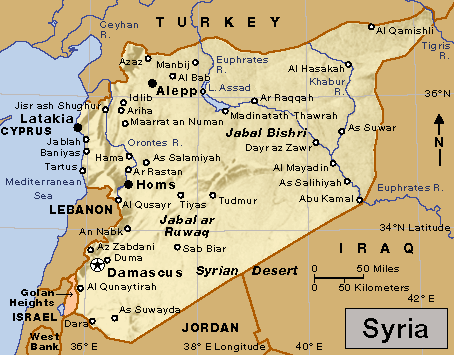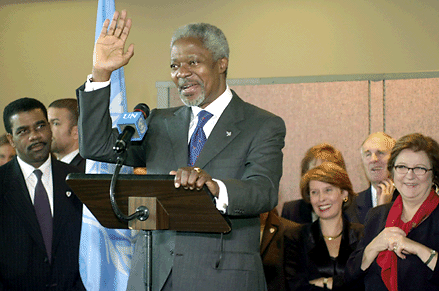Syrian Diplomats Expelled Over Atrocities
Tuesday, May 29th, 2012May 29, 2012
Major Western nations today expelled Syrian diplomats in response to the massacre of 108 civilians in the Houla region of Syria on May 25. (Houla is an area northwest of the city of Homs, center of the 14-month uprising against the regime of Syrian President Bashar al-Assad.) Outrage over the killings–one of the gravest atrocities in the uprising–prompted the governments of Australia, Canada, France, Germany, Italy, the Netherlands, Spain, Switzerland, the United Kingdom, and the United States to inform the various Syrian legations that top diplomats are to leave within the week.

(World Book map; map data © MapQuest.com, Inc.)
In Syria’s capital, Damascus, United Nations (UN) special envoy Kofi Annan announced that he has warned Assad that time is running out. “We are at a tipping point,” he stated at a news conference. “The Syrian people do not want the future to be one of bloodshed and division. Yet the killings continue and the abuses are still with us today. As I reminded the president, the international community will soon be reviewing the situation.”
UN human rights spokesman Rupert Colville announced earlier in the day that investigations suggest that most of those killed in the village of Taldou, near Houla–including 49 children and 34 women–were “summarily executed,” killed by close-range gunfire or knife attack. Survivors claimed that the army and the feared shabiha militia from nearby Alawite villages carried out the atrocities. (Alawites are a mystical Sunni Muslim religious group prominent in Syria. The Assad family and most Syrian government officials are members of the sect.) It is widely believed that the shabiha–Arabic for “thugs”–are the Assad regime’s hired goons.

Kofi Annan (AP/Wide World and Kathy Willens)
On May 27, the UN Security Council, meeting in emergency session, condemned the Syrian government “in the strongest possible terms” for “the killings . . . of dozens of men, women and children and the wounding of hundreds more.” The council pronounced the “outrageous use of violence against civilians” constituted a violation of international law. (Russia, for the first time, acted with other members of the council against Syria, a long-time ally.) According to UN monitors, before the atrocities took place, the area had been bombarded with artillery and tank shells, weapons available only to the Syrian army. The Syrian government has blamed the massacre on terrorists and Islamic extremists. At least 10,000 people have died in Syria since protests against the Assad regime broke out in March 2011.
Additional World Book articles:
- Diplomacy
- Hafez al-Assad
- Middle East: From Fall to Spring (a special report)
- Syria 2011 (a Back in Time article)


